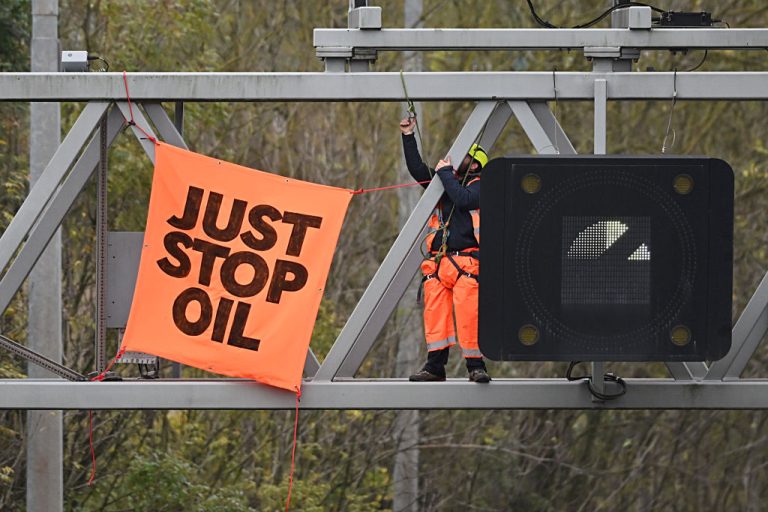A British news reporter was arrested for reporting on a climate activism social disruption protest and held for five hours without explanation or apology.
“It was absolutely terrifying being in a cell with a pad for a bed in one corner and a metal toilet in the other,” Charlotte Lynch, a reporter for the British broadcaster Leading Britain’s Conversation (LBC), said during a webcasted segment about her encounter with officers of the Hertfordshire Police last week .
Lynch had been covering for some weeks the recent rise in controversial protest actions by Britain-based environmental anarchy group Just Stop Oil (JSO).
‘Just Stop Oil’
Just Stop Oil has declared its mission to use civil disobedience and violent actions to stop the further rollout of fossil fuel manufacturing and licensing.
The group recently made headlines by blocking highways and dousing the Silver Fin Building offices of Barclays and Shell UK in Aberdeen in orange paint on Nov. 14.
Success
You are now signed up for our newsletter
Success
Check your email to complete sign up
Even more dramatically, JSO adherents, seemingly unhampered, attempted to ruin Vincent van Gogh’s Sunflowers of Arles painting at the National Gallery in London last month.
Lynch said she was watching the protesters climbing up a gantry along the M1/St. Albans interchange between Junctions 20 and 21 on Nov. 8. Lynch herself was standing on a nearby road bridge when two police officers approached her.
Suspicion of conspiracy
The LBC reporter explained her situation and showed her press card, but the officers nonetheless arrested her on “suspicion of conspiracy to commit a public nuisance” and transported the flabbergasted journalist by van to a police station in the city of Stevenage.
“I was just doing my job. What’s also terrifying is what this means for press freedom. It was blindingly obvious I was a reporter,” she said, describing her 5 hour stay in a police cell as “absolutely terrifying.”
READ MORE ON CLIMATE TERRORISM AND PRESS FREEDOMS
- German Climate Extremists Block Road, Stop Rescuers From Saving Injured Cyclist. She Died.
- The FBI Raided an ABC Investigative Journalist’s Home in April. He Hasn’t Been Seen Since
In a reaction to BBC News, Constable Charlie Hall, Hertfordshire Police Chief, said the police officers had “been instructed to act as quickly as they can, using their professional judgment, to clear any possible protesters.”
However, he admitted that “in retrospect, an arrest would not have been necessary.”
Necessary or not, Lynch didn’t get an apology from the police
“I haven’t been contacted by anybody from Hertfordshire Constabulary to apologize to me and to confirm that I will be de-arrested and my DNA removed from their records,” the journalist said.
Not by accident
Two other reporters, documentary maker Rich Felgate and photographer Tom Bowles, were arrested while covering the JSO performance. Subsequently, they were held for 13 hours the day before.
According to Felgate, at least seven other journalists were also arrested during the JSO protests.
“I’m aware of at least 7 arrests of journalists during the [JSO] protests so far, perhaps more after today,” the documentary maker said on Twitter.
Even more so, Felgate suspects that the arrests are actually a policy.
“This is second time I’m been arrested [sic] whilst working in the last month. At this point, all these arrests of journalists are not by accident,” he added.
A counterpoint
However, Police and Crime Commissioner for Hertfordshire, David Lloyd, brought up a counterpoint to the media, saying they needed to “reflect on how [it was] reporting” the protests, the BBC reported.
Lloyd explained, “The reason that Just Stop Oil are continuing to do this is that they know they will get publicity if they do it,” adding, “Frankly, [the protestors] have got exactly what they want by having front page news using their name every single day.”
“One thing that the journalistic community could do, through their editorial policy – and I very much believe in a free press – but we do need to think about whether or not we’re adding flames to the fire by having these sorts of discussions.”
Lloyd’s remarks were not well received by Michelle Stanistreet, the National Union of Journalists (NUJ) General Secretary, who told the network: “The commissioner’s apparent desire to influence editorial lines instead of recognizing the work of journalists as fundamental to upholding a free press is of grave concern.”
Stanistreet added, “Shifting blame onto editors publishing content that is clearly in the public interest fails to recognize the severity of recent incidents and their wider impact on the public’s right to stay informed.”

















